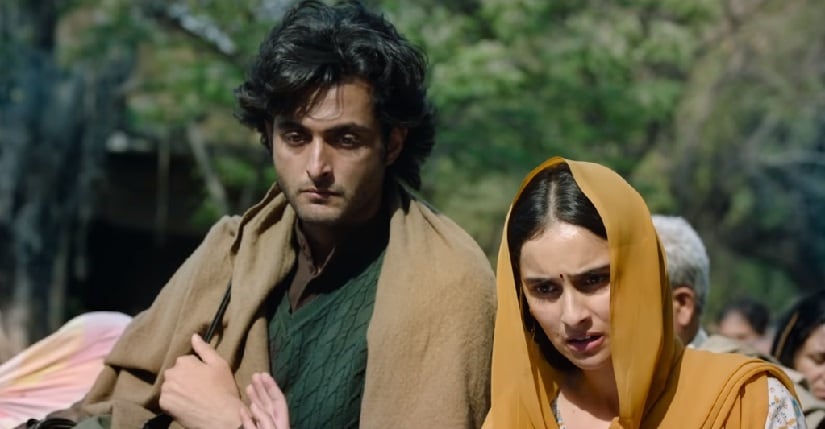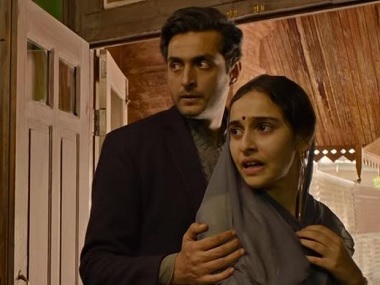Language: Hindi Five years after testing waters in Hollywood with Broken Horses, Vidhu Vinod Chopra now returns to his homeland with his ’love letter’ to Kashmir, Shikara. The film is aptly titled because it establishes the setting in one go. Also, it is a symbolic title because Shikara is inherently a love story though it is set against the backdrop of the exodus of Kashmiri Pandits in 1990. However, the romance between a Kashmiri Pandit couple Shanti (Sadia) and Shiv Dhar (Aadil Khan), though poetically shot, ends up doing the same damage that Bollywood does, in its whitewashed romanticisation of the valley. The refuge of love, though a balmy escape, becomes a cop-out when it is upheld as a solution, and given precedence over the horrors of the exodus. [caption id=“attachment_7871951” align=“alignnone” width=“825”]  Aadil Khan and Sadia in a still from Shikara. YouTube[/caption] In the interviews leading up to the release of Shikara, Chopra had maintained that he has been making the film for over 12 years, and hopes it can stir up the conversation around the return of Kashmiri Pandits in the valley. However, the film indulges in too many romantic trappings for it to come across as a hard-hitting social drama. Sure, there are moments of genuine horror in the latter part of the first half. But the residual feeling after the end-credits roll is that of romance being glossed over as the ultimate solution to every problem in the world. Love is indeed the perfect antidote to hate of any kind but one wishes the film portrayed the displaced Kashmiri Pandit’s plea with honesty, rather than highlight the compromise to make a home anywhere else on earth. The helpless cries of a displaced Kashmiri Pandit (a real-life refugee who is now dead) saying, “Mujhe Kashmir wapis le chalo” (take me back to Kashmir) are definitely more effective than Shanti telling Shiv over 25 years after their displacement, “Mera ghar toh aap hi hain na” (you’re the only home I have). Moving from romance to the timing of the film, there surely is conversation about whether a film that details the struggles of Kashmiri Pandits should release at a time when Muslims are facing threats of persecution amid the ongoing Citizenship Amendment Act and National Register of Citizens uproar. Shikara was scheduled to release on 22 November last year but Chopra claims he postponed it because he did not want to cash in on the then-recent abrogation of Article 370 . Though the timing is not perfect even now, but the question is: When will it ever be? Chopra has waited for over 12 years to tell his story. The issue of a troubled Kashmir has been a constant for decades now, with no close prospect of a resolution. The timing can never be ‘perfect’.
There is concern, however, on whether the right wing or their supporters will cite this film as an example of the injustices Hindus have gone through in the past in order to justify the ongoing persecution of Muslims. But Shikara can interpreted at a more human level, beyond the surface of religion, to underline that this tragedy should not befall any community, whether Kashmiri Pandits in 1990 or Muslims now.
Chopra seems to have put on blinkers while telling the account of the Kashmiri Pandits. He does not even touch upon the atrocities Kashmiri Muslims are facing for years even though his narrative ranges from the 1980s to 2018. He remains focused on showcasing the plight of only the Kashmiri Pandits. It definitely stems from his personal account, of how his late mother could never return to the valley or how his cousin was killed in the communal riots back then. But his film is a time capsule that should not exist in a vacuum. His choice to tell a myopic story makes for a simple narrative but never a layered exploration of the political underbelly that dominates the valley even today. Having said that, Shikara is by no measure a propagandist film. Its intention is the most sincere. Chopra’s earnestness to tell a story, that has remained in his heart for decades, shines through. He also makes an attempt to end the vicious cycle of hate by taking creative calls such as not showing the faces of the perpetrators. Hate certainly has no face, as he correctly suggests. But it does have a Taqiyah (Muslim cap) either, as costume designer Sachin Lovalekar demonstrates. That is, however, not an issue since it is a historically established fact that the exodus of Kashmiri Pandits was a communal act. Chopra also deserves credit for being creatively detached from the film despite being emotionally invested. He gives enough play to Rangarajan Ramabadran’s cinematography (from stunning aerial shots to loquacious wide sots), Shikhar Mishra’s crisp and pacey editing, and Sonal Sawant’s impeccable production design. He uses the technical aspects to complement his narrative, which is a sign of a master in full command of his craft. Though we have seen a less glossier side of Kashmir in recent films like Meghna Gulzar’s 2018 espionage drama Raazi and Vishal Bhardwaj’s 2014 Hamlet adaptation Haider, the nuances in the depiction of Kashmiri culture and atmosphere make Shikara a more lived-in experience. [caption id=“attachment_8015731” align=“alignnone” width=“825”]  Sadia and Aadil Khan in a still from Shikara. Twitter[/caption] The director also elicits remarkable performances from the lead actors. Newcomers Sadia and Aadil are Kashmir-born Muslims, and hence, fit well in the familiar environment. They also have commendable chemistry, and display enough heft to carry the film on their shoulders, despite being new to the business. The highlight of Shikara, however, are the ‘junior artists,’ who are actually 4,000 of the 4,00,000 Kashmiri Pandit refugees who bore the brunt of the exodus first-hand. It is unfathomable Chopra managed to make them not only congregate after all these years but also sensitively nudge them to revisit their past horrors and undergo the ordeal all over again. A memorable insight Chopra shared during the promotions of the film was when he asked some refugees to give a second take, only to get a response, “Hum teen baar ye nahi kar sakte. Pehli bar kia tha na 15 saal pehle” (We can’t revisit the horror again. We already did it once 15 years ago). Chopra is known for skillfully juxtaposing romance against politics. But what remains amiss in Shikara is a memorable score by Ishaan Chhabra, AR Rahman, and Qutub E Kripa. The music and songs (particularly ‘Ae Wadi Shehzadi’ and ‘Mar Jaayien Hum’), written with great imagination by Irshad Kamil, serve the situations well but do not boast of rich recall value. Also, the screenplay by Chopra, Abhijat Joshi (the co-writer of all Rajkumar Hirani films), and Kashmiri Pandit investigative journalist Rahul Pandita (whose book Our Moon Has Blood Clots has hugely inspired Shikara) has been structured well but as mentioned above, could have achieved greatness with a more holistic perspective. Rating: ***


)
)
)
)
)
)
)
)
)



